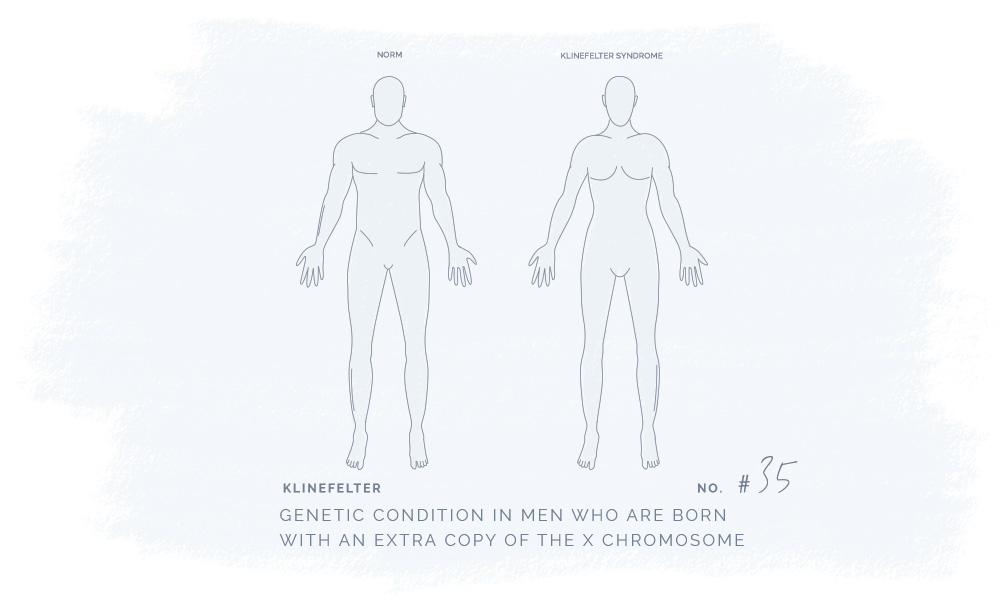Klinefelter Syndrome
Category
Genetic
REVIEWED BY
Our Biomedical Scientist
Reviewed based on
Literature Discussion of Autism’s cognitive impairments
Last update
October 2020

What is Klinefelter Syndrome
Klinefelter syndrome is a genetic condition found in men who are born with an extra copy of the x chromosome. The condition may negatively affect testicular growth, causing under-average size testicles, which can lead to lower testosterone production. The syndrome is often not diagnosed before adulthood; however, medical attention is important as it may interfere with fertility.1
Symptoms
Signs and symptoms of Klinefelter syndrome depend on the age and severity of the condition and the symptoms, therefore, vary greatly. Some men will be greatly affected whereas some men will never be diagnosed.1
In adult males, the main symptoms of the condition may be:
- Little to no sperm production
- Infertility without medical attention
- Under-average size testicles and penis
- Less facial- and body hair
- Enlarged breast tissue
- Lower than the average sex drive
- Weak bones
- Less muscular appearance than average
- Increase belly fat
Klinefelter syndrome may also increase the risk of developing a range of mental disorders such as anxiety, depression, autism spectrum disorders, and social-, emotional and behavioral challenges.1
Cause
Klinefelter syndrome is caused by a random error that results in men being born with an extra sex chromosome. This condition is not inherited.
Each person has 46 chromosomes including two chromosomes determining the biological sex of the individual human. Women have two X gender determining chromosomes (XX) whilst men have an X and a Y chromosome (XY).1
The cause of Klinefelter syndrome could be due to the following reasons:
- 1 extra copy of the X chromosome in each cell (XXY), the most common cause
- 1 extra X chromosome in some of the cells, known as mosaic Klinefelter syndrome causing fewer symptoms
- More than 1 extra copy of the X chromosome, a rare type of Klinefelter syndrome. This form of syndrome leads to more severe symptoms.
The connection between Cannabinoids & klinefelter syndrome
Studies find that CBD and THC may have great therapeutic potential and may be used to help treat Klinefelter Syndrome. CBD and THC are well-known cannabinoids, however, they do not have the same psychoactive effects. THC is psychoactive while CBD does not possess psychoactive effects. According to WHO guidelines, the cannabidiol CBD is generally well tolerated with a good safety profile.
There is evidence showing that the endocannabinoid system may be involved in the development of autism spectrum disorders, therefore, treatment with cannabinoids may be beneficial.3
However, there is a lack of evidence for cannabis use in autism spectrum disorders, indicating that large-scale controlled trials are needed to better understand risks and benefits.4
The literature discussion is an overview of the published results from scientific studies investigating if and how cannabinoids can be beneficial in the treatment of Klinefelter Syndrome. The overview will be updated regularly to ensure the newest and most accurate information.
Today, we are not able to provide any literature discussion about cannabinoids and Klinefelter Syndrome but please refer to our Autism review.
Clinical trials are research studies that examine new treatments and evaluate their effects on human health outcomes.
Today, we are not able to provide any clinical trials about cannabinoids and Klinefelter Syndrome but please refer to our Autism review.
CANNABINOIDS & RECEPTORS
Below you find the plant cannabinoids, cannabinoid receptors, and endocannabinoids that are associated with the potential therapy.
If you have any further information relevant to the connection between Klinefelter Syndrome and cannabinoids or find any of the information inaccurate, outdated or incomplete please contact us here.

